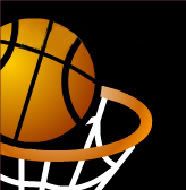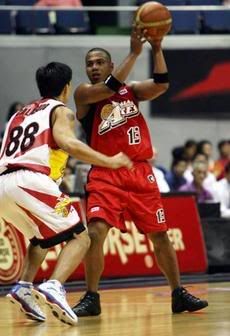Chip off the old block
By Joaquin M. Henson
The Philippine Star
Thursday, September 6, 2007
For the record, San Antonio Spurs assistant coach and shooting doctor Chip Engelland never played for the Philippine national team. He would’ve been eligible to suit up as a naturalized player in 1987 but never got the chance.
Last week, Engelland was in town and reunited with his former teammates in an emotional visit. It was his first trip back in 22 years.
Engelland joined two other naturalized players Jeff Moore and Dennis Still on the San Miguel team that won the Jones Cup in Taipei in 1985. He also played on the San Miguel team at the World Clubs Championships in Spain that year. Both tournaments were club, not national team, competitions.
Moore and Still, however, saw action for the Philippine squad that regained the Asian Basketball Confederation (now FIBA-Asia) title in Kuala Lumpur in 1986.
Under the FIBA rules at the time, a naturalized player was required a three-year notification to the secretary-general at the governing body’s headquarters before qualifying to represent his new country. The limitation was only two naturalized players could be enlisted by a national team. Additionally, a naturalized player must not have played for any other country as FIBA requires a player to suit up for only one country in his lifetime.
Engelland took out Filipino citizenship by naturalization in 1984. Moore and Still became naturalized citizens in 1982.
FIBA relaxed its rule on the three-year notification to accommodate the US team that recruited Nigerian Hakeem Olajuwon as a naturalized player for the 1996 Atlanta Olympics. Olajuwon was given instant eligibility and set a precedent for the future. In exchange for the relaxation of the rule, FIBA reduced the number of naturalized players in a national team to just one.
“We were ahead of our time by over 20 years,” said Engelland. “Now, other Asian countries are employing naturalized players. When we did it in the 1980s, it was frowned upon. There was nothing wrong in what we did as there is nothing wrong in what some countries are doing today. We played by the rules which allowed naturalized players. Now, I understand the Philippines is considering to recruit a naturalized player for the future.”
In the last FIBA-Asia Olympic qualifiers, Jordan paraded a naturalized citizen in Rasheim Wright and Lebanon in Joe Vogel. It was rumored that Qatar recruited several Senegal players but passed them off as locals.
Even Russia has recruited a naturalized player. President Vladimir Putin himself signed a decree to naturalize black American point guard J. R. Holden for the national team a few years ago.
There are several foreigners now playing in the country, all eligible for naturalization to play on the national team. The list includes Nigeria’s Sam Ekwe of San Beda College and Serbia’s Marko Batricevic of La Salle.
The EDSA Revolution abruptly ended the stay of Engelland, Moore and Still here. They were on holiday in the US when the new government took over Malacañang and were never asked to return.
Engelland, 46, said he struggled and started from the bottom in his basketball career after the Philippine dream went out the window. He played in minor leagues to earn a small living until Steve Kerr hired him as a shooting coach.
“I owe Phil Jackson a lot because as Chicago coach, he let me work with Steve,” said Engelland. “I had my own shooting camp called Chip Shots but it was my work with Steve that got me my reputation. Then, Grant Hill called and things began to work out.”
Moore found a playing job in Mexico where he became a Michael Jordan of sorts. “Jeff was an NBA-type of player,” said Engelland. “I’ve lost touch but someone told me he settled down in Mexico where he played into his 40s.”
As for Still, Engelland said he heard the burly University of South Alabama center now works for a construction company in Kansas City after a playing career in Argentina.
Engelland, the youngest of three and the only boy, said he got his nickname Chip from the old saying “chip off the old block.” His real first name is Arthur.
While he was in town, Engelland got together with former San Miguel and Northern Cement teammates like Hector Calma, Allan Caidic, Samboy Lim, Elmer Reyes, Joseph Uichico, Jerry Codiñera, Franz Pumaren and Pido Jarencio.
Three of Engelland’s teammates have died. They were his best friend Alfie Almario, Rey Cuenco and Teddy Alfarero. Engelland and his wife Jessica met Almario’s widow Irene Atayde and their four children for dinner during their visit.







No comments:
Post a Comment